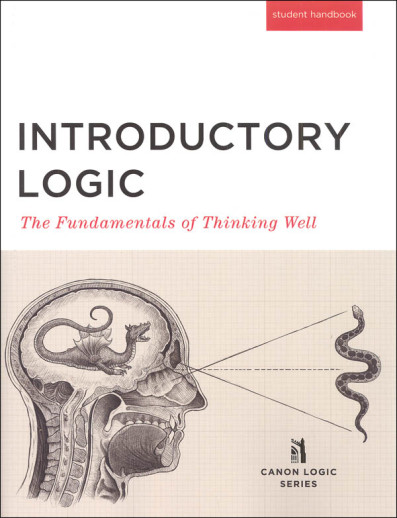We use cookies to make your experience better. To comply with the new e-Privacy directive, we need to ask for your consent to set the cookies. Learn more.
Introductory Logic: The Fundamentals of Thinking Well Student Text 5ED
Studying formal logic can be intimidating without the right help, but knowing how to think logically isn't just for "experts." Logic should be your secret weapon. It's the tool for learning how to use other tools. It's the bones that give a clenched fist its structure (and knuckles). With that in mind, we have painstakingly designed Introductory Logic for everyday students, teachers, and parents who've never tackled syllogisms or fallacies before, but who know just how important learning logic is.
In Introductory Logic, you'll get the benefit of our years of teaching experience as you learn the fundamentals you need to think well wherever you are, including: How to properly define terms for maximum precision and accuracyand thus win the debate; How to form and interpret statements, the building blocks of logical thought; How to compose valid syllogisms, and--just as importantly--expose the invalid fakes using counterexamples; How to analyze arguments in normal English; How to identify and deflect informal fallacies (one of the most instantly applicable parts of logic); And much more!
Anybody can do Introductory Logic. Brand new, clean, easy-to-read layout, lots of margin notes for key points and further study, a step-by-step modern method, and exercises for every lesson (plus review questions and review exercises for every unit) all make Introductory Logic the perfect choice for establishing an in-your-bones knowledge of the fundamentals of thinking well.
Every person should have a course in logic at some point. It is important for children to be prepared to argue logically, defend their positions, and spot fallacies. The only thing more frustrating than knowing your opponent is wrong is to have to combat a well-constructed, logical argument when you are unable. There is no real defense against sound logic and thinking. Many logic books are written at too high a level for younger students to comprehend. Canon Press says this course is written for primary and secondary students. Cathy Duffy, however, says the content is beyond typical high-school-level material. I have looked through this book and found it simpler to use and understand than the course I had in high school. I would hope that my 12 year olds could handle it without much difficulty. It is a complete and fairly rigorous course, and is from a Christian perspective. The course builds from basic to more complex, giving students the tools they need, with good examples along the way. Exercises teach logical statements, truth and validity, universals and particulars, categorized relationships, syllogism, logical fallacy, symbolic logic, and much more. The newest version of the course includes 36 lessons (with 39 consumable exercises). Definitions of important terms, key points, and caution signs regarding common errors are set apart in the margins of the text. The Student Text begins with a section on defining terms, which lays the foundation for the lessons that follow. The book has a new cover, perfect binding, and has perforated exercise pages for easy removal. The Teacher Edition includes both full-year and semester lesson schedules; answers to all exercises, review exercises, quizzes and tests; the entire content of the Student Text; and detailed daily lesson plans with teacher's notes. The DVD Set includes lessons from Brian Kohl who has taught at the high school and college levels. The Homeschool Package contains the Student Text, Teacher Edition, Test & Quiz Packet, and DVD Set. Make Introductory Logic one of their required courses and arm them for battle!







Great course for our high school age kids!
This publication is part of my son's online learning curriculum
Homeschool logic elective
I will be using this for the Classical Conversations Challenge B class.